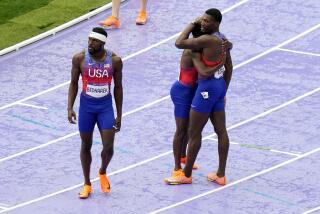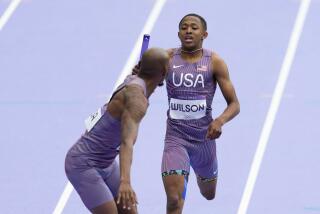DOOMED FROM THE START : Coach Explains Disqualification: U.S. Had âSpruce Gooseâ of Relay Teams
SEOUL â Maybe the U.S. menâs 400-meter relay team was never meant to fly.
âWe were like the Spruce Goose,â Coach Stan Huntsman said, comparing his team to Howard Hughesâ famous wooden plane. âWe couldnât get it off the ground.â
The team, heavily favored to win the gold medal, was disqualified from the Olympics Friday for a pass out of the exchange zone, from Calvin Smith to Lee McNeill on the final handoff, during first-round heats.
The disqualification denied Carl Lewis the chance to win a third gold medal. He did not run in the preliminaries, but was expect to run the anchor leg in the final.
Lewis was sad but not bitter after the incident.
âI think itâs very important not to lay the blame on the athletes who were disqualified. They gave their best just as we all have,â Lewis said.
âI feel bad, of course, that I will not have the opportunity to run the 4x100 meters relay. I felt confident that our U.S. team would set a world record. We had the greatest set of sprinters ever assembled.â
The disqualification leaves Lewis with six golds and a silver from two Olympics. He won four golds in Los Angeles in 1984.
Here he has successfully defended his long jump title, was second in the 200 meters and was awarded victory in the 100 meters after Ben Johnsonâs disqualification for taking a banned drug.
The United States bobbled two of the three handoffs in the race. So, trouble wasnât a total surprise. It loomed almost from its inception.
âThis personifies the 400-relay team,â Huntsman said.
âIt hasnât been a cohesive group from the start. We tried and tried and tried . . . â
The more Huntsman and sprint-relay coach Russ Rogers tried uniting the team, the more friction seemed to develop.
Not since the U.S. Olympic trials ended July 23 had the team run as a unit. Occasionally, pieces of the team competed, but mostly the squad was scattered, with some in Europe, some in the United States and two members not even chosen until the end of August.
One of the late additions was McNeill, who had finished eighth in the 100-meter dash at the trials.
It was the second leg that was causing the problem. After long and heated arguments among the team coaches and the personal coaches of the athletes, Albert Robinson, the fourth-place finisher in the trials, was named the No. 2 runner.
However, he had some bad experiences with the baton during meets in Europe, and, as a result, Lewis lobbied to have Joe DeLoach replace Robinson.
During his heavy campaigning for DeLoach, Lewis, at times, threatened to quit the team, said he was definitely going to run, and was on the verge of being dismissed for âdisruptive behavior.â
Following the first round, Rogers had planned to substitute DeLoach for McNeill in Saturdayâs semifinals, then add Lewis for the final. He would not say, however, who Lewis would replace in the final, although he added that DeLoach and Lewis worked on the same unit Friday during practice--after the first-round heats and before the disqualification was announced.
âI never felt good about this team, because we could never get it together,â Rogers said. âWe never came out of practice with a happy feeling, a good feeling.â
Besides Lewis and DeLoach, Rogers bypassed Mike Marsh and Emmit King, the No. 6 and 7 finishers in the 100 trials, in favor of McNeill for the first round.
âI have no regrets--I had faith in those four people,â Rogers said of the first-round unit. âThey came to practice and were with me 100%. I think if I had put another foursome out there, I would have some regrets.
âIf I could do it again, I would--thatâs how much confidence I had.â
Rogers said the key to preventing this happening again would be to have âmore communication, more understanding as a team.â
Huntsman said he was surprised the bad pass came on the Smith-to-McNeill exchange.
âI felt more confident about that position than any other on the team,â he said. âNot that I wasnât confident in the other positions.â
It was the third time since the relay became part of the Olympics in 1912 that the U.S. team was disqualified for passing out of the zone. The only other time the Americans did not win the gold medal was in 1980, when they did not compete in the Moscow Games.
More to Read
Go beyond the scoreboard
Get the latest on L.A.'s teams in the daily Sports Report newsletter.
You may occasionally receive promotional content from the Los Angeles Times.






